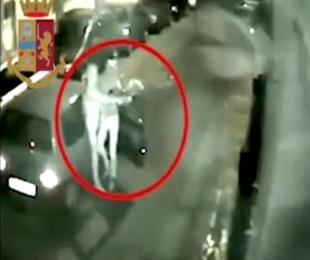- Mafia: the Guardia di Finanza seizes property for 63 million euros from entrepreneurs in Gela
- Brescia, maxi blitz against the "Stidda": 70 arrests and kidnappings for 35 million
Share
September 26, 2019Awesome blitz of the State Police in the city of Gela. The dangerous Mafia organization of the Stidda has been disjointed and in recent years has raged in the Sicilian town, appropriating part of the territory with the typical Mafia force and violence, which has always characterized it. In prison leaders, followers and associates who have managed a thriving drug trade have infiltrated the legal economy through convenient businesses, extortion, especially with the method of imposing the products of their companies.Many punitive expeditions of the 'stiddari', organized also with the use of weapons and with damage followed by fires, to the detriment of those who dared to oppose their criminal power, with a "military" potential consisting of "500 lions", that is of 500 armed men who could have unleashed yet another mafia war. The investigations carried out in the proceeding allowed to photograph the violent wing of the clan, reconstructing multiple extortion behaviors put in place against merchants and entrepreneurs riotous or unwilling to submit to their will, which - despite this - have found the courage to denounce extortions.
Blitz in Brescia: 69 arrests, seizures for 35 million euros
Sixty-nine arrests, kidnappings for 35 million euros and a hundred searches, for a total of about 200 suspects. These are the numbers of the maxi operation that involves about 300 agents of the Flying Squad and of the Economic-Financial Police Unit of Brescia, with the support of the Sco of the State Police and of the Scico of the Guardia di Finanza, against a Stiddara mafia gang. , with headquarters in Brescia, which has heavily polluted various economic sectors through the marketing of fictitious tax credits for tens of millions of euros.
The operation called "Leonessa" has been underway since last night and provisions issued by the Public Prosecutor's Office of Brescia, District Anti-Mafia Directorate have been implemented.
In summary, the investigation by the State Police and the Guardia di Finanza allowed some 200 people to be referred to the Judicial Authority and 75 restrictive precautionary measures issued. So people were arrested for mafia association, 15 subjects for undue compensation, 18 for crimes against the Public Administration and 27 for issuing and using invoices for non-existent operations.
The stidda, a mafia organization that at the end of the eighties in Sicily had militarily opposed to Cosa Nostra also making itself responsible for brutal murders against men of the State, in its northern version has proved capable of a real evolutionary metamorphosis replacing the traditional crimes new illicit businesses.
The mafia organization, through the support of white-collar workers, has allowed a vast audience of entrepreneurs to evade taxes for several tens of millions of euro, selling non-existent tax credits with distorting effects on the real economy further conditioned by the reinvestment of illicit profits achieved. The enormous profitability of the business led to moments of tension with the cosca operating in Sicily, whose drug trafficking was initially financed precisely by the proceeds of the sale of fictitious credits. The investigation has therefore allowed to monitor the evolution of the relationships between the two associations that have finally signed a real pax mafia, aware, as stated by one of the suspects, that: "the war does not lead to anything , while peace leads to something ".
The leadership of the northern gang was hired by a triumvirate composed of people of high criminal caliber who had previously held top positions in the stidda gelese and in his Lombard projections. The stiddari, camouflaged in the new operating environment, made their illegal services available to Northern entrepreneurs, which consisted of the sale of non-existent tax credits used to reduce the tax debt. The link between the mafia and the entrepreneurs was represented by the "white collar", which identified among their customers (mainly scattered among Piedmont, Lombardy, Tuscany, but also in Lazio, Calabria, Sicily) those available for easy savings and who will now have to face the crime of undue compensation of taxes.
In the short time span of a year and a half, the criminal group was able to commercialize non-existent tax credits of around 20 million euros, transferred to entrepreneurs operating in various sectors of the economy.
While changing business, the stiddari have kept the "ancient" mafia modes in their daily actions. even if "in a suit and tie", they remained faithful to the typical behavior of mafia, showing an ability to intimidate against competitors and affiliates deemed unreliable, offering, in addition to fictitious credits, protection to entrepreneurs who have requested them, excluding with violence the participants of the companies in which they had reinvested the illicit proceeds.
The investigations have also allowed the re-use and recycling activities to be reconstructed, implemented through companies operating, for example, in the sectors of administrative, financial and business consultancy, sponsorship of events and sports marketing, car rental, boats and aircraft, wholesale trade, specialist medical studies, lighting equipment manufacture and bar management. Here, then, is that the sources of illicit financing deriving from tax crimes become the instrument to take root in the real economy, as a real criminal "metastasis" that pollutes the order and economic-financial security. All at the expense of the healthy part of entrepreneurship forced to succumb to unfair competition from organized crime.
The survey - in addition to profiles on a national scale - was also a real magnifying glass on the city of Brescia, allowing us to identify pathological dynamics, focus them and repress them. In addition to the mafia one, in fact, two other investigative lines have also emerged. The first concerns the traditional sector of invoices for non-existent transactions, for a total amount of 230 million euro. The second concerns some entrepreneurs who, by giving bribes and or favors to public officials, obtained significant tax savings.

